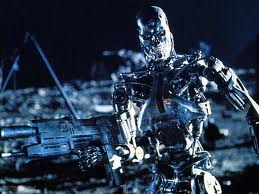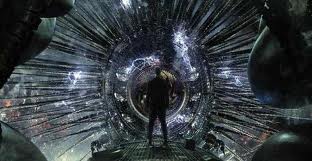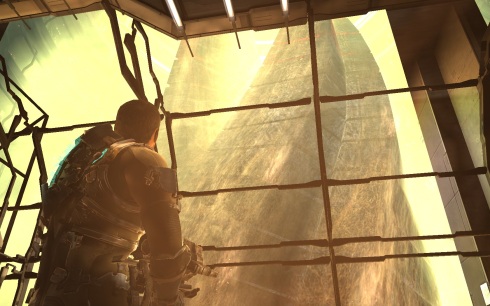This is Mass Effect March! In honor of the release of Mass Effect 3, this entire month is devoted to digging into this epic trilogy. We’ll explore the different races, themes, and some major story arcs. At the end of the month we’ll cap things off with a week of posts on Mass Effect 3 to see how everything is resolved (or not). We turn our focus again to one of the races in the Mass Effect universe, the Geth.
The entrance of Legion into Mass Effect 2’s story was a welcome surprise. He allowed us to gain unique insights into the Geth. They are a race of sentient programs who operate “mobile platforms.” They’re essentially a group of robots who became self-aware. This situation seems familiar….
Oh right. Well we certainly won’t be able to say sci-fi didn’t warn us when the robots take over. But while the Geth share many of the hallmarks of the classic robopocalypse, it turns out there’s more depth to their story and one might expect. Yes, the Geth did displace the Quarians, their creators, from their homeworld. But afterwards they separated themselves from the rest of galaxy to advance their race in isolation. As it turns out, they’re rather indifferent to organic life.
The Geth are, however, an enemy that has plagued the galaxy, which means that they aren’t all peaceful. The Geth known as Legion informs Commander Shepard and crew that the “bad Geth” that they’ve been fighting are actually a small fraction of their population who chose to separate after being recruited by the Reapers. So the Geth have separated into two factions with differing ideologies. Legion represents the good guys and he wants to help Shepard.
Legion’s name is lifted right from Mark 5:9 where Jesus confronts a demon possessed man. The demon(s) in this man take the name Legion because there are many demons in one man. Likewise, Legion the Geth is comprised of many programs in one physical body. The Biblical allusion works very well as an analogy for Legion as a body comprised of smaller entities, but the overall context doesn’t quite fit. The Biblical story is about a man who’s affliction by demons was used to show Jesus’ power over them. Legion is not demon-possessed, but could be considered a “good” character who just happens to be described by a Biblical story.
Legion does, however, provide one possible way of explaining a complex Christian concept- the Trinity. God is one being and there is only one God, this is made clear in verses like Deuteronomy 6:4. However, Jesus and the Holy Spirit are also God. So we have one God in three parts- Father, Son, and Spirit. So…how can there be three, but one? This is a mind-bending problem, but perhaps Mass Effect can help us a bit.
Legion describes the Geth as a collection of millions of programs, but let’s ignore that for now. What’s unique about the Geth is that they function with a single consciousness. Legion explains that there is constant communication with the rest of the Geth despite being far away in various forms. So that’s kinda like how God is, one single consciousness that exists in different forms in different places.
…so maybe using a video game character as an analogy for the Trinity isn’t going to make it into any theology books, but hopefully it helps just a little.
Let’s bring this back down to earth and use the Geth for a different analogy. The way they function and work together is like what God desires for his people. Philippians 2:2 urges believers to be in “full accord and of one mind.” We are like separate “mobile platforms” who should seek to be of the same mind and purpose of God. 1 Corinthians 12:12 describes God’s people as one body with many parts, which means that we’re all connected to one mind. But each person is a different part of the body that does something unique and important. The great thing about being amongst the followers of Jesus is that we are all united under a common purpose, but we get to use our individual skills to contribute to the mission in unique ways.
Questions:
Which part are you? What’s your function?
What mission are you a part of?
The next entry will look at a common tactic used by the Reapers and how we tend to suffer from it as well.







